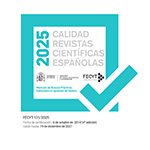Los límites del primer intervencionismo estatal en el mercado laboral: la Inspección del Trabajo y la regulación del empleo de las mujeres (Cataluña, 1900-1930)
Abstract
This article aims to analyse the impact of labour legislation on gender segregation of work during the three first decades of the twentieth century. Labour inspection is at the centre of the research. Its first section focuses on the resources of the Inspectorate in Catalonia and the characteristics of the working class population subject to inspection. The second part has a wider focus and analyses how the inspectors followed established rules, taking the number of infractions reported as the basic indicators and comparing these with the actual working conditions and the common practices of the representatives of workers. A breakdown of infractions and sanctions is also included. Two conclusions can be of particular interest: a) the discourse of domesticity had little or no influence on labour norms or on the efforts of the Inspectorate; b) the only concrete repercussion of the regulation was a belated and limited exclusion of women from night work, which, however, did not prevent the textile factories from making full use of female workers.Downloads
Article download
License
In order to support the global exchange of knowledge, the journal Cuadernos de Historia Contemporánea is allowing unrestricted access to its content as from its publication in this electronic edition, and as such it is an open-access journal. The originals published in this journal are the property of the Complutense University of Madrid and any reproduction thereof in full or in part must cite the source. All content is distributed under a Creative Commons Attribution 4.0 use and distribution licence (CC BY 4.0). This circumstance must be expressly stated in these terms where necessary. You can view the summary and the complete legal text of the licence.











